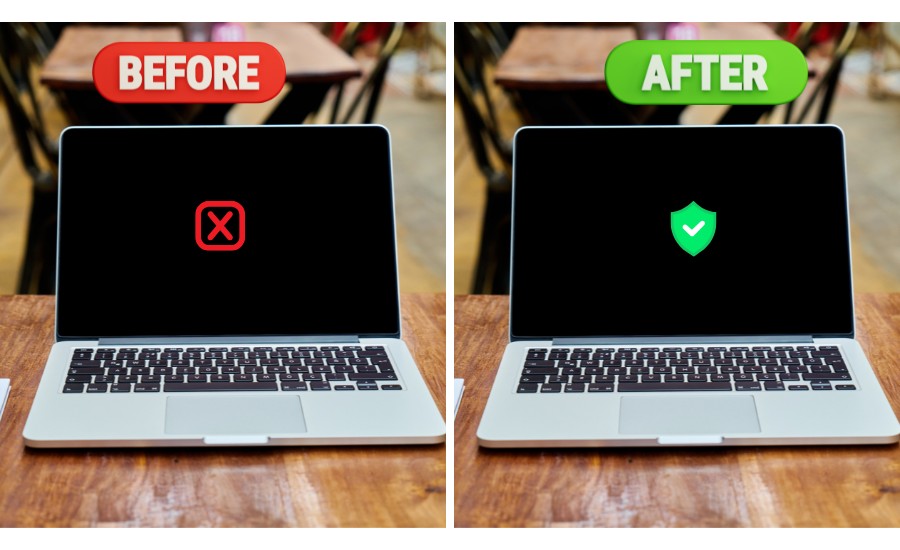November 16 – 22 is International Fraud Awareness Week, and it’s got us thinking about a cybersecurity glow-up, because—just like our wardrobes and our homes—our digital lives need an occasional refresh. Fortunately, you don’t need to drop a lot of cash or book a hair appointment to protect yourself online—but you do need to stay current.
Consider it the digital equivalent of swapping out your old jeans for something that actually fits. A cybersecurity makeover is all about updating old habits, tightening loose ends, and building smarter routines to keep hackers and scammers out of your personal information. Here’s where to start:
1. Make Multi-Factor Authentication Your New Default
Multi-factor authentication (MFA) is like a deadbolt for your online accounts. Even if someone gets your password, MFA keeps them from logging in without an extra verification step—like a code texted to your phone or generated by an app. Turn it on everywhere you can, especially for email, banking, and social media accounts. Once MFA is in place, protect those codes like you would any other password, and don’t share them with anyone.
2. Clean Up Your Social Media
When it comes to Facebook, Instagram, TikTok, and other social media apps, assume that anything you share can be seen by anyone—even if you are not sharing publicly. And, oversharing online gives scammers free ammunition. They can use details like your pet’s name, birth year, or hometown to guess security questions or impersonate you. So, take a few minutes to:
- Review what’s public on your profiles.
- Hide personal data like your address, phone number, birthdate, school name, and hometown.
- Keep your location data private. For example, on an iPhone, go to Settings > Privacy & Security > Location Services > Facebook. Then click either “While Using the App” or “Never.”
- Limit who can see your photos and posts.
- Delete old content that you don’t need to save.
3. Strengthen Your Password Game
It’s no surprise that “Password123” won’t cut it, but in today’s world of cybercrime, neither will passwords involving your kid’s birthday, your pet’s name, or your favorite band name (looking at you, Hoobastank94!). Instead, use strong, unique passwords that include a mix of upper- and lowercase letters, numbers, and symbols. Better yet, use a password manager to generate and securely store your passwords.
It’s also wise to avoid using the same password across multiple accounts. If one account is compromised, the others are instantly at risk.
4. Protect Your Devices with Antivirus Software
Antivirus software acts like a security guard for your computer or phone, scanning for malware and blocking suspicious activity. Many operating systems now come with solid built-in protection, but it’s worth reviewing your settings to ensure the software is turned on and updated. If you want extra protection, consider reputable third-party software from trusted companies like Norton, Bitdefender, or Malwarebytes.
5. Stay Alert with Account and Credit Monitoring
Even with strong security habits, breaches happen. Setting up account and credit monitoring gives you early warnings of suspicious activity—like new accounts opened in your name or unexpected changes to your credit score. Maps Credit Union members can also monitor account activity easily through online and mobile banking alerts.
6. Keep Your Software Updated
Those system update pop-ups you ignore? They often patch critical security flaws. Set your devices to update automatically so you’re protected against the latest threats without having to think about it.
7. Think Before You Click
Phishing emails, fake login pages, and “urgent” texts are still some of the most common ways hackers gain access. Before clicking any link or attachment, take a second to double-check who it’s from. If something feels off, it probably is.
Unfortunately, cybersecurity isn’t a one-time project—it’s a lifestyle change. A few small updates today can save you a major headache (and possibly your identity) later. Just think of it as digital self-care. After all, keeping your information secure, your accounts protected, and your peace of mind intact goes a long way toward a happier you.

Want more cybersecurity tips?
- Take our “How Safe Are You Online?” quiz.
- Learn the fraud myths that put your money at risk.
- Find out how to stay safe while shopping online.
